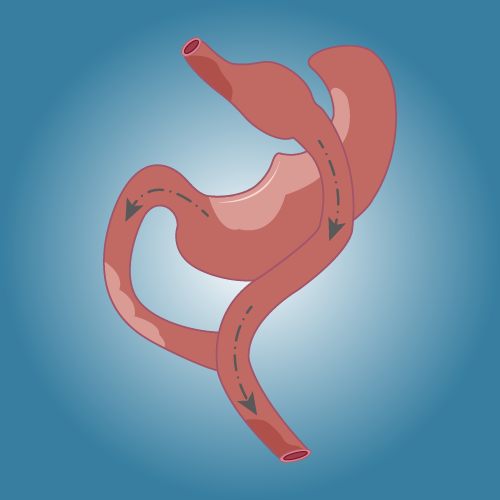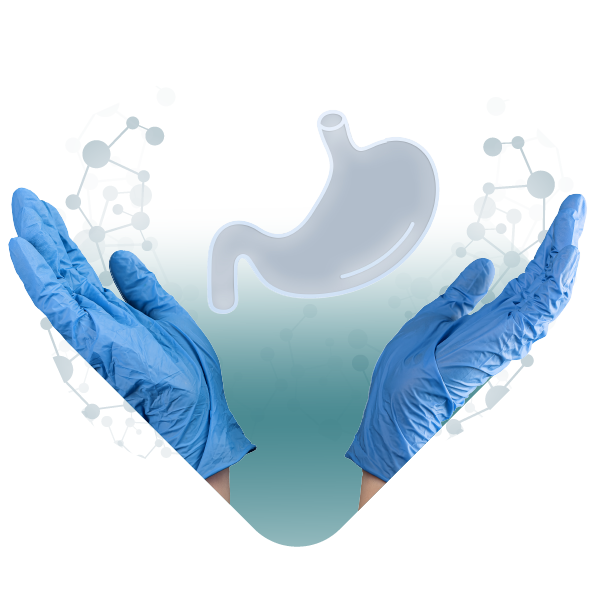
Gastric Bypass in Turkey
Contact us for a Gastric Bypass in Turkey/Antalya
from £3,790

Gastric bypass in Turkey / Antalya - costs & procedure
- Hospitalisation4 days
- Treatment duration1-3 hours
- Regeneration2 days
- Kostenab 3,790 €
High quality at a fair price
The leading agency for medical tourism in Turkey
Save up to 60 %
Save up to 60 % on your treatment in Turkey
No hidden costs
Transparent package prices for your operation in Turkey.
Table of Contents

Gastric Bypass Techniques in Turkey
If a stomach-OP using a bypass technique is carried out in Turkey, a part of the digestive tract is bypassed by the surgical procedure. This results in reduced food intake, which supports the weight-reduction in two ways. In Parallel, however, it also limits the absorption of nutrients, wherefore often a danger of deficiencies occurs, and the patient has to take lifelong vitamins (e.g., vitamin B12), trace elements as well as proteins.
The gastric bypass in Turkey is the most complicated stomach OP within the bariatric surgery, in which the capacity is reduced to about 15-20 ml. The rest of the stomach is then sewn together with a loop of the small intestine (bypass). In Turkey, the gastric bypass operation is performed under general anesthesia, and the patients will be stationed in the intensive care unit for observation.
At the beginning of the gastric surgery, the surgeon reduces the stomach (to 15-20 mm) and sutures it with a low-lying part of the small intestine, so that the twelve-finger intestine is excluded from digestion. Thus, food and digestive juices first intermingle in the middle small intestine, which results in a lower calorie intake.

The Roux-Y-Gastric Bypass – Gastric Bypass in Turkey
Gastric Bypass in Turkey: The roux-y-gastric bypass in Turkey is one of the most normally performed gastric-OPs worldwide and assists with lessening – inside the initial two years after the laparoscopic medical procedure – up to 70 % of the body weight. Once more, your specialist in Turkey isolates the pyloric part from the stomach, to frame an around 20 ml huge gastric pocket.
The upside of this gastric careful technique is, that the remainder of the stomach stays in the patient, so hypothetically – regardless of whether just once in a while – a total deconstruction of the first stomach would be conceivable.

Online BMI calculator
Here you can find out your current BMI.

The Omega (Mini) Bypass – Gastric Bypass in Turkey
On account of the omega loop mini bypass in Turkey or scaled down sidestep, the specialist doesn’t cut off the small digestive system, however interfaces it to the gastric sack around two meters after the duodenum. Specifically, this sidestep variation has tracked down an overall application inside the corpulence medical procedure, and is subsequently one of the most normally involved variation in Turkey.

The Transit Bipartition (according to Santoro)
A tranit bipartition by Santoro is another gastric bypass strategy which is particularly utilized when weight is related with diabetes (type-2). Transit bipartition means ‘digestive tract division’ – i.e., other than the immediate redirection of food through the small digestive tract, it can likewise enter the digestive system through the ordinary way. This not just actuates the regular hormonal systems that lead to an early satiety, an unfortunate ingestion of supplements is forestalled simultaneously (malabsorption).

The Biliopancreatic Diversion
In the biliopancreatic diversion (BPD), the specialist decreases the stomach to a size of around 20-30 cm. Here, the remainder of the stomach is stitched with a circle of the small digestive system, so the duodenum is skirted. Because of this gastric medical procedure, in which just around 7.5-10 cm of small digestive system stay, the admission of fats and sugars is enormously diminished and subsequently the weight reduction is advanced.

The Duodenal Switch
Gastric Bypass in Turkey: On account of the BPD with duodenal switch (DS), the specialists situated in Turkey eliminates the enormous piece of the stomach (corpus and fundus) and structures a stomach-tube. Here, the duodenum is cut across and the stomach is stitched to the small digestive tract (around 100 cm before the colon), as well. Benefits of this strategy are both the safeguarding of the stomach guard as well as the sphincter muscle at the stomach exit.
Along these lines, the alleged “unloading condition” is forestalled: If sugar-containing food excessively fast arrives at the small digestive tract and accordingly into the blood, the patient can encounter hypoglycemia, which can lead, for instance, to sickness and perspiring.
Who is considered suitable for a Gastric Bypass?
In general, those suffering from obesity – i.e. with at least a body mass index (BMI) of 40 (40 kg/m2) or severe physical deficits at a BMI value of 35 – especially over a longer period – may undergo bariatric surgery for health reasons.
Gastric bypass Turkey / Antalya – Before and after photos
Here you can see pictures of our gastric bypass patients from Antalya, Turkey. These photos show impressively how this operation was for them.
Gastric Bypass Turkey / Antalya – Costs & Procedure – Frequently Asked Questions
Find out more about the cost and procedure of gastric bypass surgery in Antalya, Turkey. We provide you with clear answers and important insights to help you make your decision for this life-changing surgery with confidence.What is a gastric passport?
Basic Principle of Gastric Bypass
The procedure reduces the size of the stomach and alters the path of food intake, thereby reducing the amount of food and calories consumed.Procedure Implementation
During a gastric bypass, the stomach is divided into a small upper portion and a larger, unused lower portion. The small portion is directly connected to the middle section of the small intestine, effectively reducing food intake.Long-term Changes and Adjustments
This procedure requires a permanent change in eating habits and often lifelong use of dietary supplements. Regular medical follow-up is essential to ensure success and monitor potential complications. A gastric bypass provides a sustainable solution for weight loss but demands a high level of commitment and discipline from the patient. It is important to make the decision for a gastric bypass after careful consideration and under expert medical guidance.Why have a gastric bypass in Turkey?
Cost-effectiveness of Gastric Bypass Surgery in Turkey
One of the main reasons why patients opt for a gastric bypass in Turkey is the comparatively lower cost. High-quality medical services are provided here at prices often significantly lower than those in Western countries.Highly Qualified Medical Experts
Turkey boasts qualified and experienced surgeons who are often internationally trained. These experts employ state-of-the-art techniques and procedures to achieve optimal results.Modern Medical Facilities
Turkish hospitals are equipped with the latest medical devices and adhere to international standards. This ensures a high quality of medical care and safety.Combination of Medical Care and Recreation
Many patients take the opportunity to combine their medical stay with a vacation. Turkey offers a variety of cultural and natural attractions.Comprehensive Care and Follow-up
In Turkey, patients receive comprehensive care that extends from pre-examination to follow-up. Many clinics also offer assistance with travel arrangements. However, the decision to undergo a gastric bypass in Turkey should be carefully considered. Comprehensive research and expert medical advice are essential to ensure that the treatment meets individual needs and expectations.What are the costs for gastric bypass abroad?
Cost Advantage in Turkey
In Turkey, the prices for a gastric bypass start at just €3,290. This price difference compared to other countries makes Turkey an attractive option for many patients.Price Comparison with Other Countries
The costs in other countries such as the USA, UK, or Germany are significantly higher. This is due to different medical standards, labor costs, and overall pricing in healthcare.Cost Comparison Table
| Country | Cost of Gastric Bypass |
|---|---|
| Turkey | Starting from €3,290 |
| USA | $15,000 – $25,000 |
| UK | £9,000 – £15,000 |
| Germany | €8,000 – €15,000 |
Conclusion
This table clearly demonstrates that Turkey offers a cost-effective solution without compromising on the quality of medical care. However, it is essential for patients to consider all aspects, including travel and potential additional costs, and to seek comprehensive advice before making a decision.Which is better gastric bypass or gastric sleeve?
Gastric Bypass:
- Effectiveness: Often more effective in treating accompanying conditions such as diabetes.
- Weight Loss: Typically results in faster and sometimes higher weight loss.
- Complexity: Technically more complex surgery with a higher risk of surgical complications.
- Dietary Requirements: Stricter dietary restrictions and a higher risk of nutrient deficiencies.
Sleeve Gastrectomy:
- Procedure: Less complex than gastric bypass, without rerouting the intestinal tract.
- Risk: Lower risk of surgical complications and nutrient deficiencies.
- Weight Loss: Slightly slower weight loss compared to gastric bypass but still significant.
- Reversibility: Not reversible, but technically less invasive.



